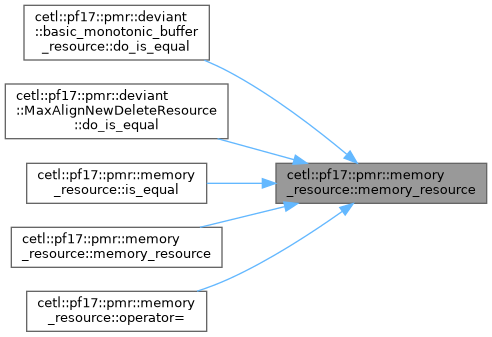#include "cetl/pf17/memory_resource.hpp"
Public Member Functions | |
| memory_resource ()=default | |
| memory_resource (const memory_resource &rhs)=default | |
| virtual | ~memory_resource ()=default |
| memory_resource & | operator= (const memory_resource &rhs)=default |
| void * | allocate (std::size_t size_bytes, std::size_t alignment=alignof(std::max_align_t)) |
| void | deallocate (void *p, std::size_t size_bytes, std::size_t alignment=alignof(std::max_align_t)) |
| bool | is_equal (const memory_resource &rhs) const noexcept |
| std::size_t | max_size () const noexcept |
| void * | reallocate (void *ptr, std::size_t old_size_bytes, std::size_t new_size_bytes, std::size_t alignment=alignof(std::max_align_t)) |
Interface to a class that manages memory resources.
This implementation Adheres to memory_resource as defined by the C++17 specification. It does not incorporate changes made to this type in C++20.
|
default |
Implicitly defined default constructor.
Referenced by cetl::pf17::pmr::deviant::basic_monotonic_buffer_resource::do_is_equal(), cetl::pf17::pmr::deviant::MaxAlignNewDeleteResource::do_is_equal(), is_equal(), memory_resource(), and operator=().

|
default |
Implicitly defined copy constructor.
| rhs | The object to copy from. |
References memory_resource().
|
virtualdefault |
Implicitly defined destructor.
|
inline |
Allocate memory.
Allocates at least size_bytes of memory aligned to alignment by calling the template method do_allocate.
| size_bytes | The number of bytes to allocate. Implementations may allocate additional bytes but shall not allocate fewer. Callers should always assume that a successful call has allocated exactly the requested number of bytes. |
| alignment | The alignment of the allocated memory. CETL will treat an inability to properly align memory as an allocation failure. |
| std::bad_alloc | Throws if any allocation errors occur. Implementations shall not leak memory even if the allocation fails. |
|
inline |
Deallocate memory previous allocated by this class.
Deallocates memory by calling the template method do_deallocate. While the specification sets a precondition that p was returned by a call to cetl::pf17::pmr::memory_resource::allocate with the same size_bytes and alignment it does not require any errors to be raised if any of the inputs are invalid.
| p | A pointer returned by cetl::pf17::pmr::memory_resource::allocate. |
| size_bytes | The size passed into cetl::pf17::pmr::memory_resource::allocate. |
| alignment | The alignment passed into cetl::pf17::pmr::memory_resource::allocate. |
| nothing | (but is not noexcept). |
|
inlinenoexcept |
Compares two memory_resource implementations by calling template method do_is_equal.
| rhs | The memory_resource to compare. |
true if memory allocated from this object can be deallocated by rhs and vice-versa. References memory_resource().
|
inlinenoexcept |
A necessary evil, this method deviates from std::pmr::memory_resource.
This means CETL's memory_allocator is not ABI compatible with std::pmr::memory_resource and std::pmr::memory_resource is not, necessarily, backwards compatible with CETL. Because CETL does not require RTTI, it is not an option to define a specialized interface that fixed size resources can implement since there is no way to determine the type of the resource or to safely cast to it.
Referenced by cetl::pf17::pmr::deviant::basic_monotonic_buffer_resource::do_allocate().

|
default |
Implicitly defined assignment operator.
| rhs | The object to assign from. |
*this). References memory_resource().
|
inline |
Reallocate memory.
Follows a similar behaviour contract described by std::reallocate with the implementation defined behaviour for zero-length reallocations is to always return nullptr.
| ptr | The pointer to reallocate. If the reallocation is successful this pointer is invalid and must not be used even if it's address is the same as the returned pointer. This pointer remains valid for any failure. |
| old_size_bytes | The number of bytes returned by the original allocation. |
| new_size_bytes | The number of bytes to change ptr to hold. |
| alignment | The alignment of the allocated memory. CETL will treat an inability to properly align or to support re-alignment of memory as an allocation failure. |
| std::bad_alloc | Throws if any allocation errors occur. Implementations shall not leak memory even if the allocation fails. |